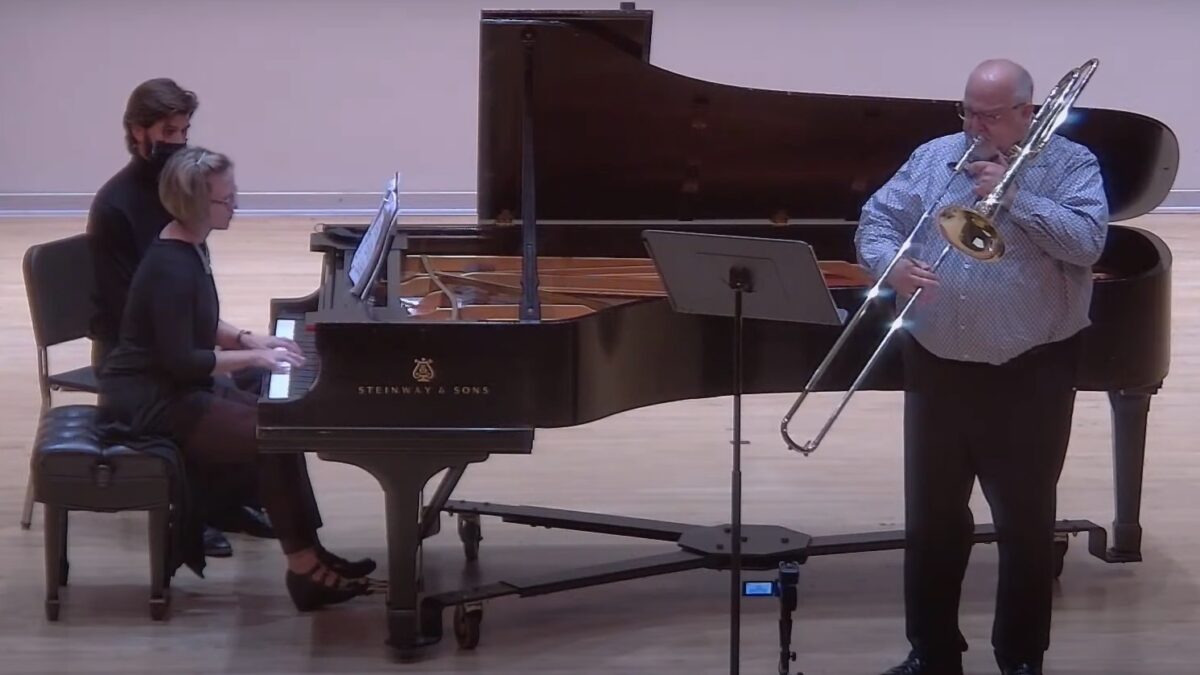The mob’s stranglehold of speech on college campuses may be beginning to loosen thanks to legal challenges aimed at strengthening the free-speech rights of college professors and students.
Just look at Western Michigan University. In 2021, WMU fired adjunct music professor Daniel Mattson solely for writing about his religious views off-campus on his own time. After a remarkably short seven months of litigation, Mattson was vindicated this year on Oct. 31.
Mattson, a professional symphony trombonist, had worked for WMU’s School of Music since 1999. He performed in the university’s Western Brass Quintet, comprised of School of Music faculty members. As part of his duties, Mattson also performed with the Western Winds, a student-faculty ensemble.
In 2009, Mattson returned to Catholicism and left behind his prior homosexual lifestyle. For several years, he wrote articles and spoke at public events explaining how the church should engage with people who experience same-sex attraction. All the while, Mattson strictly compartmentalized his religious activity from his work at WMU. He never initiated a discussion about his religious beliefs or views concerning sexuality with students.
Punished for Christian Ideas
In 2017, Mattson’s writing culminated in Why I Don’t Call Myself Gay: How I Reclaimed My Sexual Reality and Found Peace — an autobiographical account of his experience with same-sex attraction. He advocated that the church should sympathetically engage people who experience same-sex attraction while offering Catholicism as a better way.
In October 2021, Mattson agreed to perform as a guest artist at the School of Music. A recently appointed faculty member and LGBT activist discovered Mattson’s writings on his experiences with homosexuality and his recommitment to the Catholic faith. She launched a campaign to cancel Mattson’s planned events. As she posted to Twitter: “I won’t be going to any recitals by ex-gay activists, thanks.”
She engaged students, faculty members, and DEI administrators in this effort. In the weeks leading up to the recital, there was extensive discussion over email and on social media among faculty and students, many of whom expressed support for the idea that Mattson’s presence on campus was “harmful” to students who identify as LGBT.
The administration’s response to the outcry over Mattson’s religious speech was swift and harsh. Matson was first stripped of his core duties, hindered in important school activities, and finally, WMU refused to renew his teaching contract.
Mattson refused to allow activists to cancel him without a fight. He challenged WMU’s forcing him to choose between earning a livelihood as a world-class artist and mentor for aspiring musicians on campus and his life as a religious believer and witness for conflicted Catholics off-campus.
Violations of Free Speech and Religion
In March 2023, Mattson, represented by the Center for Individual Rights, a nonprofit public interest law firm, filed a federal lawsuit on Mattson’s behalf challenging his firing as a violation of his rights to free exercise of religion and freedom of speech under the First and 14th Amendments.
WMU’s efforts to cancel Mattson ran afoul of both recent and longstanding Supreme Court precedent guaranteeing the right to religious free speech. Just last year, in Kennedy v. Bremerton School District, the Supreme Court reaffirmed a longstanding rule that government action that burdens a sincere religious practice in a manner that is not “neutral” must be justified by a compelling government interest and must be narrowly tailored to that interest.
In the 2018 decision Masterpiece Cake Shop v. Colorado Civil Rights Commission, the court found that a plaintiff may also prove a free exercise violation by showing evidence of government hostility to religion. Here, the school administration had made its views clear in an email sent to the entire school community. “Mr. Mattson is also a high-visibility advocate for the position that homosexuality is a chosen lifestyle that is to be avoided. He has stated his position strongly and widely. While he is free to express his beliefs, we cannot ignore the fact that they are harmful to members of our LGBTQ community, particularly our students.”
Another body of law going back to the 1960s prohibits retaliation by a public employer against an employee on the basis of protected speech by the employee, where that speech was directed to an issue of public concern and was not made as part of the employee’s official duties.
Confronted with the controlling legal authority in Mattson’s suit and his refusal to let WMU cancel him so cavalierly, WMU was again swift to respond. Rather than attempting to defend its sectarian or viewpoint-based punishment in a court of law, less than seven months after Mattson filed suit, WMU settled the case and agreed to pay Mattson substantial damages and attorney’s fees.
These are the workings of the leftist cancel mob. Instead of a wholly government-controlled censorship regime, militant activist mobs have informally coordinated with DEI bureaucrats. Together, they have cowed administrators to censor, punish, expel, and fire students and professors who contradicted leftist orthodoxies about skin color and sex. These radicals have met the slightest deviations from DEI orthodoxy with draconian punishments, and sincere religious believers have suddenly been at risk of losing their livelihoods.
Even more rewarding than the financial compensation for Mattson is the vindication in standing up for the rights of all individuals to religious expression regardless of what others think. As more victories like this pile up, we may hope that we’re reaching a turning point in the battle against cancel culture.









